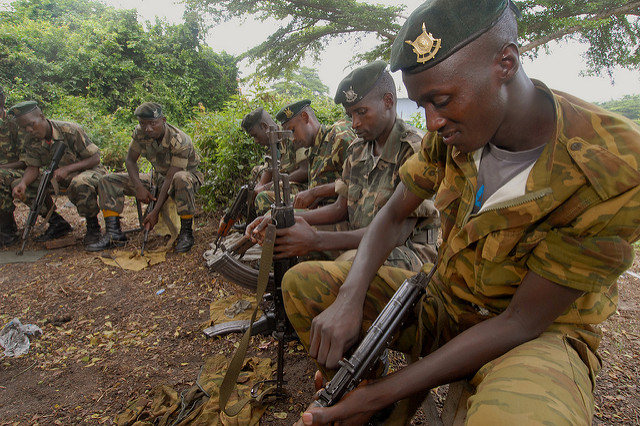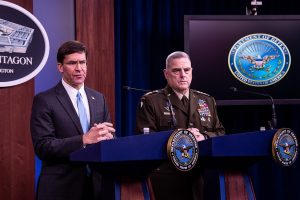by Diana Ohlbaum
“We’ve been fighting al-Shabaab for a decade, why haven’t we won?” the Trump transition team asked the State Department. To foreign policy professionals, such questions may sound naïve and uninformed. They may reflect “an overwhelmingly negative and disparaging outlook” on Africa, as one expert characterized them, and extreme skepticism about the value of foreign aid. But rather than debating the motives of those asking the questions, the national security establishment ought to seize the opportunity to reexamine some long-standing assumptions.
One of those assumptions is that by strengthening the capacity of foreign security forces, the United States can help partner countries combat terrorist and insurgent threats before they spin out of control. On paper, this seems logical. Yet despite spending roughly $20 billion a year assisting foreign military and police, the United States has precious little to show for it.
At the macro level, security sector assistance has exhibited several spectacular failures and few clear successes. After 15 years of U.S. efforts to build, train, equip, and sustain the Afghan National Defense and Security Forces, Afghanistan continues to experience deteriorating security and record-high civilian casualties. Likewise, in 2014, 30,000 Iraqi soldiers and police in Mosul abandoned their weapons and vehicles in the face of an attack by 1,500 Sunni militants, allowing the Islamic State to take over Iraq’s second-largest city. (Three years later, with nearly $1 billion of additional training and equipment and the help of Western air support, artillery, intelligence, advisers and forward air controllers, a coalition of Iraqi and Kurdish forces are battling to retake control of the city.) A decade of efforts to strengthen regional counterterrorism capabilities in the Pan-Sahel have failed to stem the rise of Boko Haram. And a concerted effort against al-Shabaab, including U.S. counterterrorism training, drone strikes and special forces operations, has been unable to alter the balance of power on the ground in the Horn of Africa. Only the achievements of Plan Colombia—including a professionalization of the military and concomitant reductions in drug trafficking, insurgency, kidnapping and murder—have been touted as clear victories for the U.S. approach.
To be fair, the poor performance of foreign troops is not necessarily an indictment of partner capacity-building efforts. Without U.S. assistance, it is possible, even likely, that partner forces would have fared far worse. It is undeniable, however, that U.S. security cooperation programs—carried out by a tangled web of offices and agencies, with differing mandates and priorities—lack an effective system for coordinating strategy, measuring results, and evaluating impact.
Thanks to an excellent new report by Rose Jackson at the Open Society Foundations, Congress and the new administration now have both an analysis of the systemic dysfunctions of U.S. security sector programs and a blueprint for fixing them. Jackson shows how mismatches between the structures and cultures of the State Department and Department of Defense (DOD), the plethora of disconnected programs and initiatives, the absence of overarching strategies, and the inability to track and compare data have generated a system that is “uncoordinated, incoherent, and even counterproductive.”
To remedy these problems, Jackson proposes changes at all levels. On the policy and strategic level, she calls for a priority-setting process that articulates specific goals, fits them to country needs, and assigns responsibility for pursuing them. She goes on to recommend the organizational and personnel changes necessary to ensure full interagency coordination and accountability for results.
Meanwhile, DOD has just issued its first-ever policy for assessing, monitoring, and evaluating security cooperation programs. The policy seeks to provide credible information in support of decisionmaking and to integrate a hodge-podge of one-off activities into a unified and coherent strategy for achieving measurable long-term gains.
The reforms announced by DOD, as well as those proposed by Jackson, may someday make it possible to answer the questions posed by the Trump transition team. But these reforms do not address the underlying assumption that improving the operational capacity of foreign security forces will lead to greater national security. When partner governments are corrupt and abusive—or perceived as illegitimate or unresponsive to the needs of their people—investing in security cooperation is the functional equivalent of putting lipstick on a pig.
Photo: Burundi peacekeepers prepare for a rotation in Somalia (US Army Africa via Flickr).






There is an abiding belief that our foreign interventions can work if only we tweak our methods. But as history has shown since the “Vietnamization” of the Viet Nam War, the U.S. has no talent for standing up foreign military forces. Col. Andrew Bacevich puts it this way:
“Indeed, the United States would be better served if policymakers abandoned the pretense that the Pentagon possesses any gift whatsoever for “standing up” foreign military forces. Prudence might actually counsel that Washington assume instead, when it comes to organizing, training, equipping, and motivating foreign armies, that the United States is essentially clueless.
“… subletting war no longer figures as a plausible alternative to waging it directly. So where U.S. interests require that fighting be done, like it or not, we’re going to have to do that fighting ourselves. By extension, in circumstances where U.S. forces are demonstrably incapable of winning or where Americans balk at any further expenditure of American blood — today in the Greater Middle East both of these conditions apply — then perhaps we shouldn’t be there. To pretend otherwise is to throw good money after bad or, as a famous American general once put it, to wage (even if indirectly) ‘the wrong war, at the wrong place, at the wrong time, and with the wrong enemy.’ This we have been doing now for several decades across much of the Islamic world.”
It’s decades past time that the U.S. question whether it should even be trying to stand up foreign militaries.
For the MIC to stop American families and people in general from their opposition to having their sons and daughters to be killed in action for the sake of the wealthy and powerful few, it has found a new way to carrying out its dirty work by hiring proxies in different regions with money! If this is not a crime I don’t know what is?